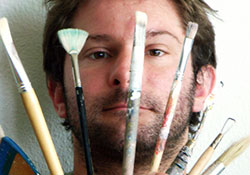Yann Krêter is an educator in a home for autistic adults in Geneva, Switzerland

(C) by Caplio R5 User
Yann Krêter is 37 years old and married with three young children. He works as an educator at Claire-Fontaine, which is part of the Ensemble Foundation, an institutional home for adults with moderate-to-severe intellectual disabilities in Geneva, Switzerland. In his spare time, he paints, sculpts and coaches wrestlers.
“The residents of the home suffer from autism, which is a lifelong developmental disability. I take care of their daily needs: help them to have breakfast, get dressed, get washed, etc. Sometimes I plan recreational activities, such as a little walk in a public park or a trip to an exhibition. I have worked in social welfare for several years with children, teenagers, the elderly and people with disabilities but, in 2005, I set myself a new professional goal and now, in parallel with my work, I am training in art therapy. It is a form of psychotherapy that uses art media as its primary mode of communication for people who are experiencing illness, trauma or challenges in their lives, and people who are looking for personal development.
I very much enjoy my work, as it meets people’s fundamental needs. I appreciate the human contact, in which each of us learns from the other. It changes all the time, and I find I constantly question myself and my work. Here we care for all people as individuals, ensure their well-being and help them to stay healthy. We support them in developing their own skills; we get them involved in and give them a feeling of responsibility for their own development; we get their families involved, and we try to broaden their social environment and their relations with other people.
I find that the Swiss health system has many positive aspects and, in general, functions well. The system has a good infrastructure and attracts highly qualified people. However, health costs are often excessive and many people have difficulty in covering the costs of insurance. Others prefer to travel abroad, where they can be treated for considerably less. I feel that, if there were less of a ‘race for a profit’, it would still be possible to reduce health care costs without seeing the quality of services deteriorate.
I think the health insurance and drug companies have too much power. Obviously, they need to make money but they shouldn’t forget their responsibilities and their original goals. I would find it inhuman if a drug that could save lives was not produced because it would not be profitable.
To improve the system, I would like to see less paperwork, more staff on the ground and less impersonal contact. All jobs in health are really all about people.”


